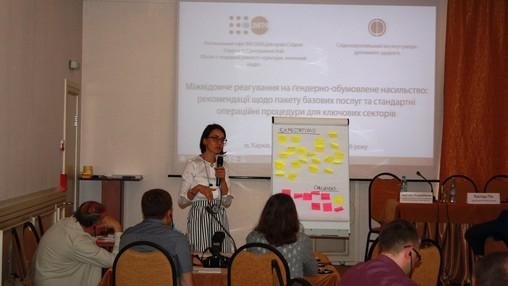UNFPA in Ukraine together with partners organizes workshops on multi-sectoral response to gender-based violence based on Global Package of Essential Services Guidelines and Standard Operating Procedures for key sectors
UNFPA in Ukraine together with partners organizes workshops on multi-sectoral response to gender-based violence based on Global Package of Essential Services Guidelines and Standard Operating Procedures for key sectors
The United Nations Population Fund in Ukraine together with UNFPA Regional Office for Eastern Europe and Central Asia and East European Institute for Reproductive Health and in cooperation with local authorities in Kharkiv and Zaporizhzhia regions is conducting workshops on multi-sectoral response to gender-based violence based on Global Package of Essential Services Guidelines and Standard Operating Procedures for key sectors.
The participants will be able to deepen their knowledge and documenting and analyzing data, reporting and referral process as well as learn about cross-country experiences of improving multi-sectoral support for victims of GBV.
From the onset of the humanitarian response phase UNFPA has been working in close cooperation with local authorities and service providers in order to ensure that any services or capacity created within humanitarian phase will be later inherited and integrated to support enhancement of the GBV response systems.
“We are happy to initiate this discussion with our partners on how we can support the region and all sectors’ partners in provision of services to those affected and ensure that the services of all sectors are coordinated and governed to respond in a comprehensive way, that these services are women and child-centered, and are accountable to victims and survivors and to each other” said Caspar Peek, UNFPA Representative in Ukraine.
In response to the growing needs of women and vulnerable groups affected by the conflict in the east of Ukraine, UNFPA together with the Ministry of Social Policy of Ukraine implements humanitarian project "Strengthening humanitarian response to the need of most vulnerable women and female adolescents affected by armed conflict in Eastern Ukraine through multi-sectorial prevention and response to GBV and access to SRH services" in five eastern regions.
The project includes a complex of actions that support society and the authorities to give effective response to the increase of violence against women and help ensure women's access to health services. UNFPA together with its implementing partner, Ukrainian Foundation for Public Health, has deployed 21 mobile teams to eastern Ukraine, each comprising professional psychologists and social workers. They provide psychosocial support in places where it has not been available before, even in the most remote rural areas. As of June 2016, UNFPA mobile teams provided assistance to over 5,000 people.
The workshops aim at capitalizing on the experience of humanitarian work and will serve a useful platform for discussion that will hopefully allow all responsible actors to move ahead with the plans to establish an effective multi-sectorial coordination mechanism and work out a holistic and coordinated approach in order to harmonize and correlate the actions developed and implemented by different relevant institutions.
UNFPA Representative saluted a recent decision of Kharkiv Majors Office to establish the Coordination Council on issues of family, gender equality, demographic development, prevention of domestic and gender violence and trafficking in people. Mr. Peek called the openness of Kharkiv and Zaporizhzhia local administrations to deepen their work on preventing and combatting gender-based violence in their regions “a demonstration of our common goals in tackling this issue” and expressed hopes “to extend the established cooperation in the future”.


